Why procrastinators procrastinate (postpone the case "for later") and how to overcome procrastination
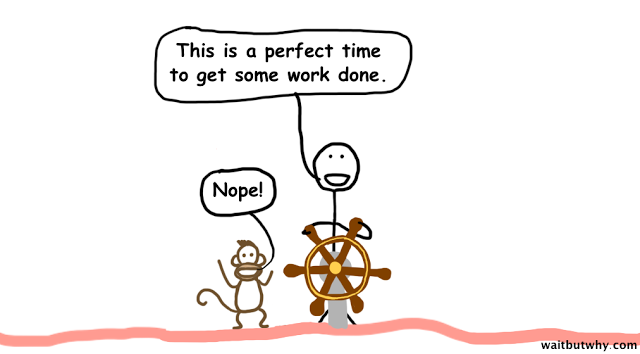
pro-cras-ti-na-tion | prəˌkrastəˈnāSHən, prō- |
noun
delaying or postponing: the first tip is to avoid procrastination.
Who would have thought that after decades of struggle with procrastination, the dictionaries would contain a solution to the problem.
')
Avoid procrastination. So elegant in its simplicity ...
Let people who are obese avoid overeating, those who are depressed should avoid apathy, and please tell someone whales ashore that they need to avoid being out of the ocean.
No, “avoid procrastination” is good advice only for non-real procrastinators. For those who say “I go on Facebook several times a day at work. I am such a procrastinator! ” These are the people who will say to the real procrastinator, "Do not put things off until later and everything will be fine with you."
The fact is that neither dictionaries nor real procrastinators understand that for real procrastinators, procrastination is not an additional option. This is something that they do not know how not to do.
The sudden freedom found in college was a disaster for me. I have not done anything and never. The only exception was the need to take work from time to time. I started doing it the day before the deadline until I realized that I could actually start at night. I started work at night until I realized that I could start it early in the morning on the deadline day. As a result, I was not able to begin my 90-page research paper earlier than 72 hours before passing. This experience ended for me in the doctor's office. There I learned that the lack of blood sugar was the cause of the numbness of my hands.
Even this post took much longer than required. I spent several hours looking at a picture of a gorilla, wondering how easily she could beat me in a fight, then thinking a gorilla could beat a tiger, then wondering who would win in a battle between a tiger and a lion, google the answer and read about it some more time (the tiger would have won). I have a problem's.
To understand why procrastinators are procrastinating, let's start by understanding how the non- procrastinator brain works:
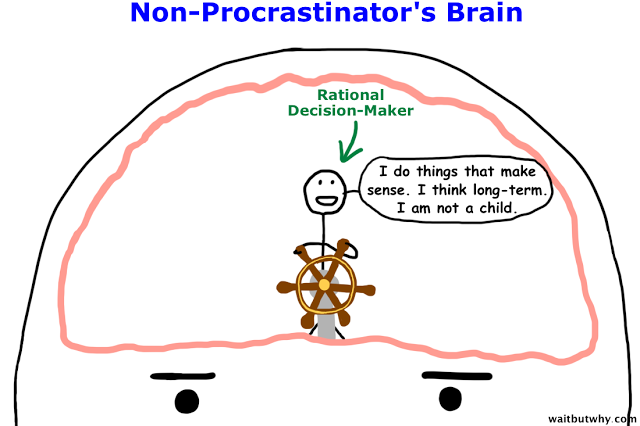
“I do things that matter. I think for the future. I'm not a child".
Pretty normal, right? And now let's look at the brain of the procrastinator:
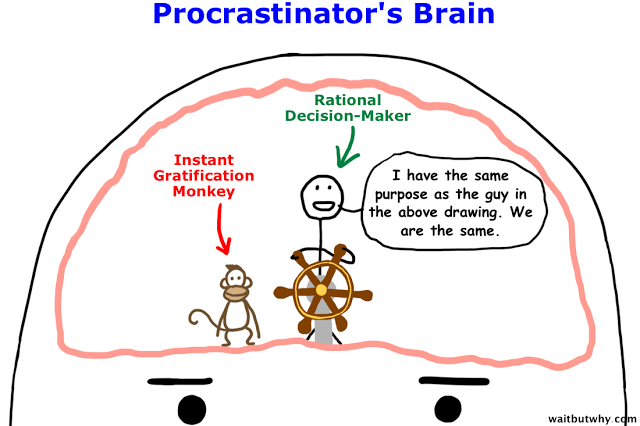
“I have the same goal as the guy in the picture above. We are the same".
Notice the difference?
Looks like a rational decision maker (Rational Decision-Maker) in the brain of a procrastinator coexists with a pet - the Instant Gratification Monkey.
Everything would be fine, even cute. But, unfortunately, no one taught the procrastinator how to live with a monkey. Doing any work becomes completely impossible.

“Great time to get started”
“Nope!”
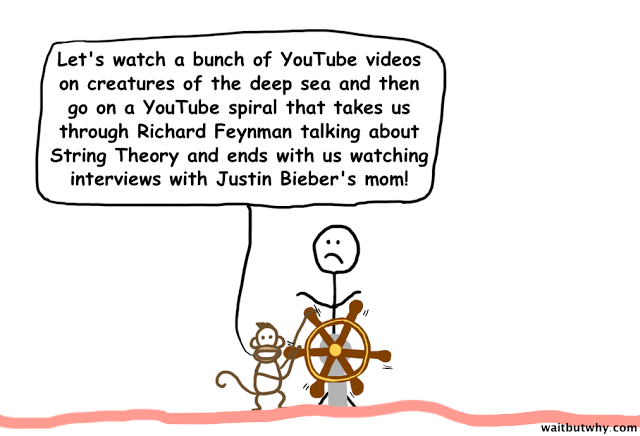
“Let's watch some videos on Youtube about creatures from the depths of the ocean, and then let's go watch other suggested videos. Let's see Richard Feynman's speech on string theory and end up with an interview with Justin Bieber's mom! ”
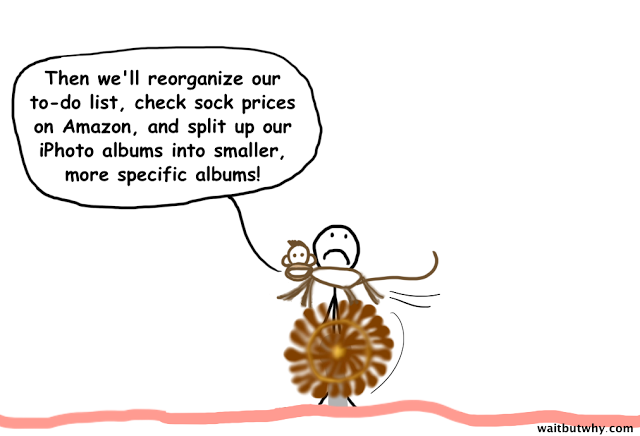
“Then we will reorganize the to-do list, check the cost of socks on Amazon, and divide our iPhoto album into several smaller albums.”
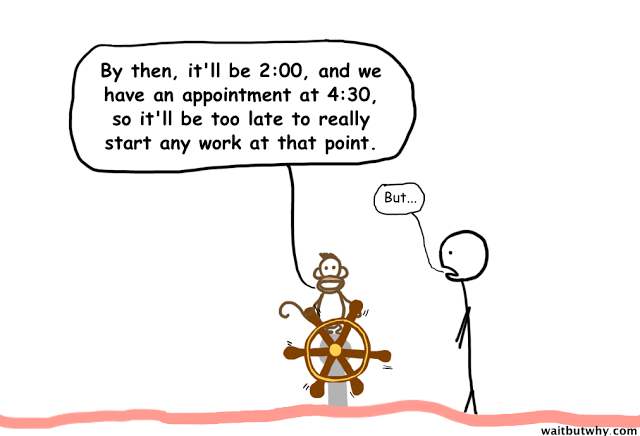
“By that time it will be 2 o'clock in the afternoon, and we have an appointment at 4:30. It will be too late to start anything at this moment. ”
The Instant Monkey Monkey must be the last creature to make decisions. She thinks only of the present, ignoring the lessons of the past and completely ignoring the future. She is interested only in the simplicity and pleasure of the moment. Man and monkey do not understand each other at all. Why run when you can stop, the monkey thinks. Why do something that is not fun at all? Why use a computer for work, while on the Internet there are so many interesting things? She thinks people are out of her mind.
The monkey knows that if you eat when hungry, sleep when you are tired, and do nothing complicated, you are a pretty successful monkey in the monkey world. The problem for the procrastinator is that the monkey has settled in the human world, putting the highly unqualified Monkey of Immediate Pleasure at the helm. At this time, the Little Man, the Decision Maker, trained to make rational decisions, and not to compete for control, does not know how to deal with a monkey. He thinks of himself getting worse and worse. The more he loses the monkey, the more the procrastinator scolds himself.
With the monkey at the helm, the procrastinator finds himself in a place called the Dark Playground (the Dark Playground). * Surely many of you are on the Dark Playground right now, reading this article;)
Every procrastinator knows this place very well. This is a place where rest happens at the wrong time to rest. The fun that takes place on the Dark Playground is not really fun at all. Because it is absolutely not deserved and the air is filled with guilt, anxiety, self-hatred, and fear. Sometimes the Human Decision Maker refuses to waste time on normal rest, and the Monkey of Immediate Pleasure will definitely not let you work, then you will find yourself doing this nonsense.
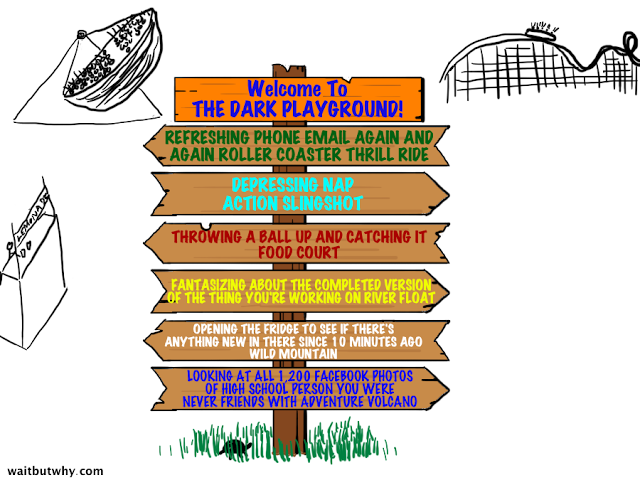
And the unfortunate Man, the Decision Maker, is trying to understand how he allowed it to happen again .
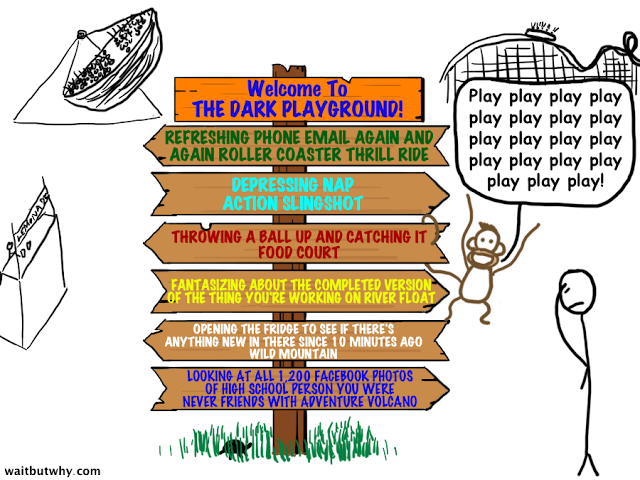
Given such a difficult situation, how can a procrastinator do anything?
It turns out that there is one thing that scares the Monkey of Immediate Pleasure to death:
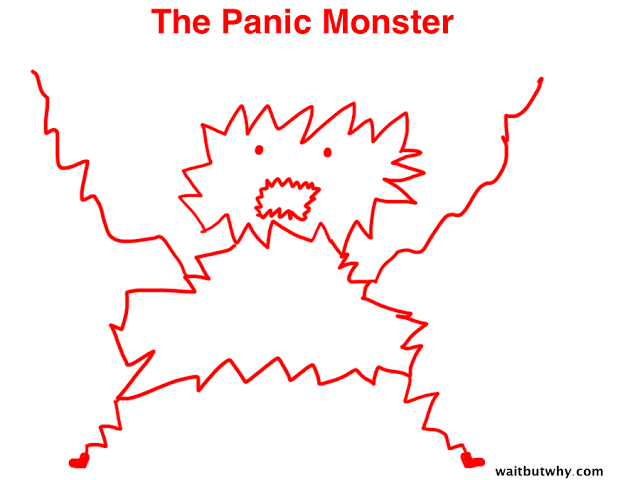
Panic slumbers most of the time, but suddenly wakes up when the deadline is too close and when there is a danger of public humiliation, career collapse and other terrible consequences.
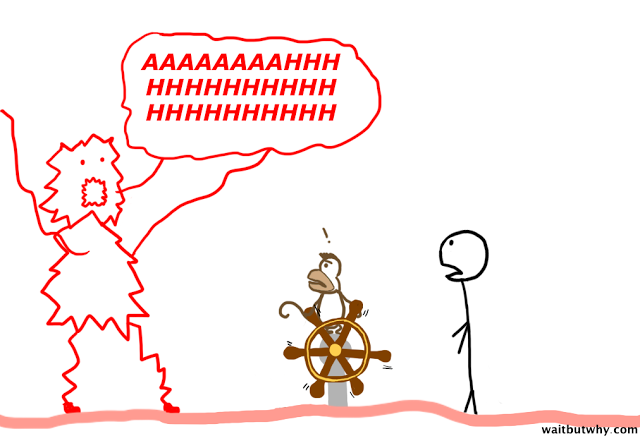
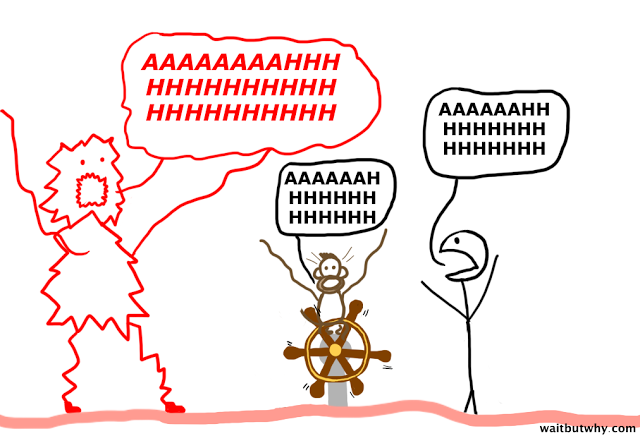
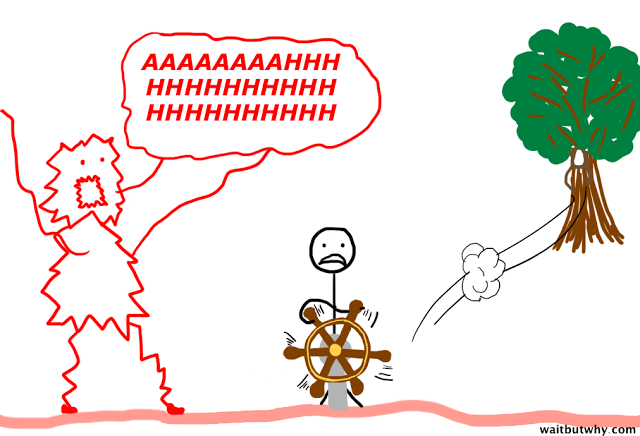
The Monkey of Immediate Pleasure, usually unshakable, is frightened by Panic. How else can you explain that the same person, who cannot write an introductory sentence to his work for 2 weeks, is suddenly able to stay up all night, struggling with fatigue, to write 8 pages? For some other reason, an incredibly lazy person will begin rigorous training in the gym, except Panic fear of becoming less attractive?
And these are lucky procrastinators. There are some who do not respond to Panic. And in the most desperate moment, they run to the tree with the monkey.
Of course, this is not the right way of life. Even for a procrastinator, who is ultimately able to do the job and maintain a reputation in society, something has to change. And that's why:
1. This is unpleasant. Too much precious time spent on the Dark Playground. The time that could be spent on enjoying the result of labor and well-deserved rest, if things were done on a more logical schedule. Panic does not please anyone.
2. The procrastinator does not reach its full potential in the end. The inability to reach one’s potential eats it over time and fills with regret and self-humiliation.
3. “Must do” may occur, not “I want to do.” Even if it is a procrastinator with a constant Panic that allows him to do work, other important things, such as learning to play the guitar, keep yourself fit, write a book, or take a bold career step, never occur. Because Panic does not usually interfere in such matters. Such things that make our life more interesting and happier for most procrastinators remain in the dust.
So how can a procrastinator become happier? How to beat procrastination?
A few notes before we begin:
- I am not a professional. Just a procrastinator who thinks on this topic all the time. Still in constant battle with their habits. But I have achieved some success in recent years and want to share with you ideas that work for me.
- This post was published late. Not only because it took 2,000 years to write it. But also because late at night I decided that I urgently need to open Google Maps and browse the whole of India up and down to learn more about the country. I have a problem's.
The procrastinator tries to defeat the Monkey, using all the same non-working methods again and again. Deep inside, he knows that the Monkey will win. He vows to change, but the pattern of behavior remains the same. Why does this happen again and again?
The procrastinator has an incredibly low self-esteem when it comes to this part of his life, allowing him to become a slave to doomed prophecies. Let's call this prophecy the Storyline. The story line of the procrastinator develops something like this:
For the sake of “I must do” in my life, I will wait until the last minute, panicking and in the end either do less than I can or hide and do nothing at all. For the sake of "I want to do" in my life, let's be honest - I will either start and give up, or most likely I will not go to this list at all.
The problem of the procrastinator is deep and requires little more than just self-discipline or changing habits. The root of the problem is embedded in the Storyline, and it is the Storyline that needs to be changed.
Before we talk about how to change the storyline, let's determine what it should be changed. What do the right habits look like and where does the procrastinator really face problems?
There are 2 components that help achieve the goal. Planning and execution. Let's start with the simple.
Planning
Procrastinators love to plan. Just because planning does not include execution , and execution is kryptonite for the procrastinator.
But when procrastinators plan, they do it in a very obscure form, which contains no details. Therefore, planning does not contribute to the implementation of any work. Planning a procrastinator looks like this:
A large list of nasty, dubious tasks and undertakings.

“Ok, I have: read things that will help in the work; make improvements in the house; come up with an idea for a book; learn how to program; plan a trip with friends; get carried away by Asian cuisine; think about a new career; and another 24 points "
"Sounds great"
A large list of dubious tasks will make the Monkey Immediate Pleasure laugh . When you make a list like this, the monkey says, "Wonderful, it sounds easy." Even if your gullible consciousness believes that it is able to accomplish its goals, the monkey knows that in your subconscious , you have no intention to accomplish these tasks.
Effective planning, on the other hand, programs you to success .
Effective planning takes a big list and selects a winner.
A large list is the initial planning stage, but planning should end with setting priorities and choosing one winner who will be your first priority. And this should be the item that is most important to your happiness. If urgent items are involved, they should go first and be completed as soon as possible in order to make room for the most important items. (Procrastinators like to use urgent, but not important points as an excuse for putting important points aside.)
Effective planning makes the vile points not vile:
We all know what vile points are. They are dark and obscure and we don’t really know where to start, how to act and where to get answers to questions about this.
Let's imagine that you want to create your own application. And you know that having created your application, you can leave the current work and become a full-fledged programmer. You think that the ability to program is literacy of the 21st century. And you, in any case, have no money for a third-party programmer and you decide to make “Learning to Program” the winner of your list. Fascinating, right?
Not really. Because “Learning to program” is an extremely nasty point. And every time you think that it would be nice to start, by coincidence you also decide to clean the incoming mail and wipe the kitchen floor as soon as possible. And never begin.
To make this item “not ugly,” you need to read, research, and ask questions in order to understand how people learn to program, step by step, and how long it takes.
It was:

Should be:
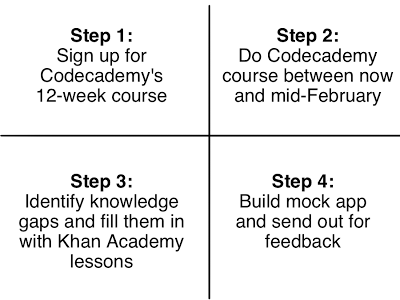
Step 1: Sign up for a 12-week programming course
Step 2: Complete the course until mid-February
Step 3: Identify the gaps in knowledge and fill them with the lessons of Khan Academy
Step 4: Create a prototype of the application and get feedback
Effective planning turns dubious items into a series of short, clear, doable tasks:
Vile and dubious items turn into a stinging potion for the Monkey Immediate Pleasure. But translating vile points into non-vile ones does not mean that the tasks will become less big. The key is to accept the fact:
Amazing, delightful achievements are a series of ordinary, not delightful tasks.
No one "builds a house." They put brick behind brick again and again and eventually it turns out the house. Procrastinators are great dreamers. They love to dream of a beautiful mansion they will build one day. In fact, they need to become workers who lay one brick after another, day after day, without giving up until the house is built.
Virtually every big deal can be broken down into basic blocks - bricks. 45-minute workout in the gym - a brick of excellent fitness. A 30-minute guitar lesson is a brick in becoming a great guitar player.
The average day in the week “I want to be a writer” and a “real writer” is almost the same. A real writer writes several pages, puts a brick. And “I want to be” the writer does not write anything. 98% of the rest of the day is almost the same. But a year later, the real writer finished the first version of the draft of the book, and the writer “want to be” has nothing.
It's all about the bricks.
But bricks require a schedule. The final step in planning is the Graph (Brick Timeline), which adds bricks to the calendar. The time intervals for these bricks are not negotiable or cancelable. This is really important to you, isn't it? The first date is the most important. You cannot start learning to program "in November." But you can start learning to program on November 21 from 6 to 7 in the evening.
Just follow the schedule and you will become a programmer. The only thing left is the execution ...
Performance
Not that procrastinators dislike the concept of fulfillment. They look at the bricks in their timetable and think “Great. It will be fun". Because when they represent a moment in the future, they represent this future without the presence of the Monkey Immediate Pleasure. The procrastinator’s vision of the future never includes a monkey.
But when the moment of laying bricks comes, the procrastinator does what he can best - he allows the monkey to take control of the situation and ruin everything.
We emphasized above that all achievements are reduced to the possibility of laying bricks in a strictly allotted time in the schedule. Let's look at a specific problem in laying one brick:
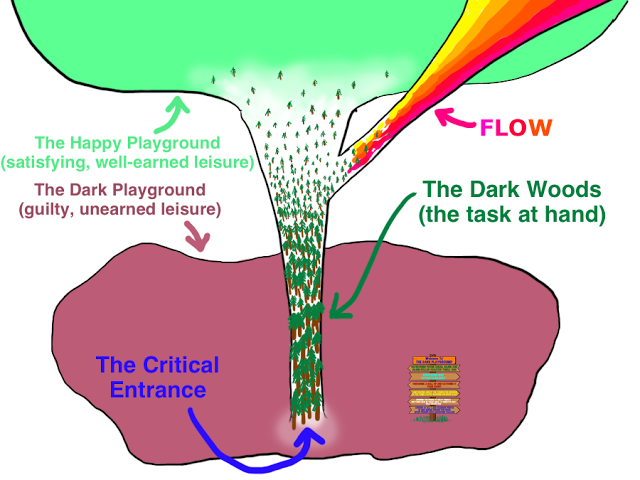
The diagram represents the problem that you will encounter when performing any task. Make a presentation in Power Point for work, go for a run, work on the script, etc. The Critical Entrance is where you start working on a task. The Dark Woods - the process of doing the work. Once you are done, you will find yourself on The Happy Playground - a place where you feel satisfied and where the rest is pleasant and enjoyable because you have completed something difficult. Sometimes you can get carried away with what you are working on and be in a Flow, where you are so immersed in the task that you have lost track of time.
These paths are as follows:
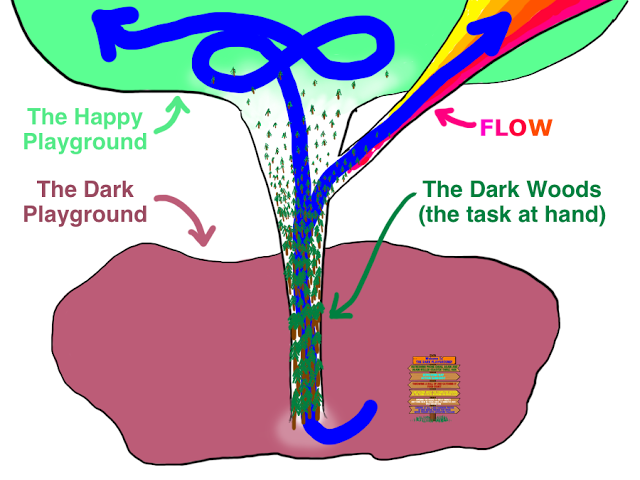
It seems easy, right?
Unfortunately for procrastinators, they tend to miss the opportunity to get to the Happy Playground and to the Flow.
For example, here is a procrastinator who never begins work on a task. Instead, he spends hours on The Dark Playground, hating himself:

But the procrastinator, who begins work on the task, but cannot remain focused on it and continues to take long breaks for surfing the Internet or preparing food.
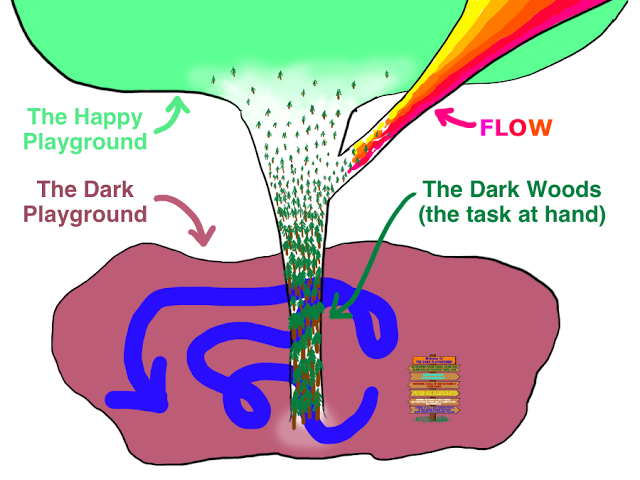
But the procrastinator, who could not bring himself to start work, regardless of the fact that the deadline was already close. In the end, the deadline was so close that the Panic Monster appeared, startling him so much that he flew through the task in time for the deadline.
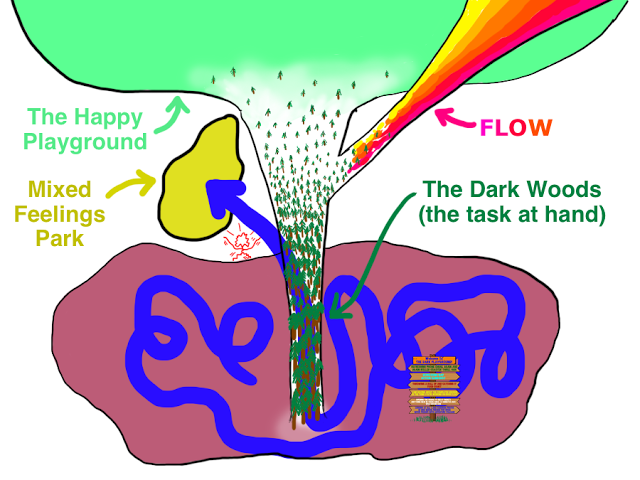
After finishing work, he feels like a decent person, because he did something, but was not fully satisfied, because he knows that he spent all day wasting everything without a reason and did not complete the task as well as he could. He falls into Mixed Feelings Park.
If you are a procrastinator, let's look at the right path that will bring you more happiness.
The first thing you need to do is go to the Critical Entrance. It means to stop doing what you do when it comes time to complete the task, get rid of everything that distracts you, and start working. It sounds simple, but this is the hardest part. This is the stage at which the Monkey Instant Pleasure will resist most:
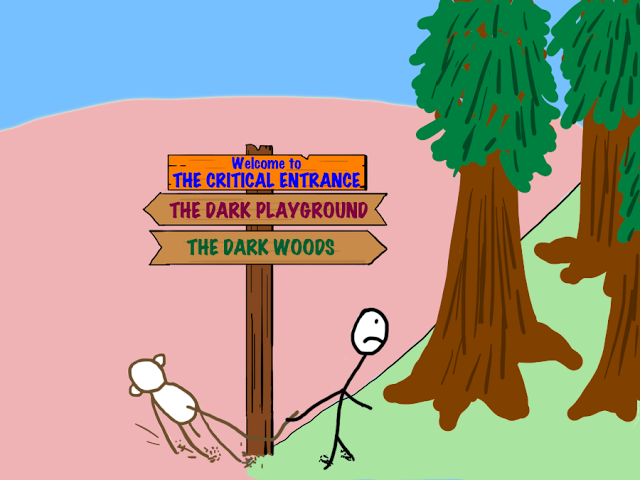
- - . (the Dark Woods), .
.
(The Dark Woods) — , . . (the Dark Woods) (the Dark Playground), . , , .
, — Excel , , , , — .

, (the Dark Woods) (the Dark Playground). . , , . — . .
, , . . , (High Self-Esteem Banana) . - .

2/3 3/4 , , . .
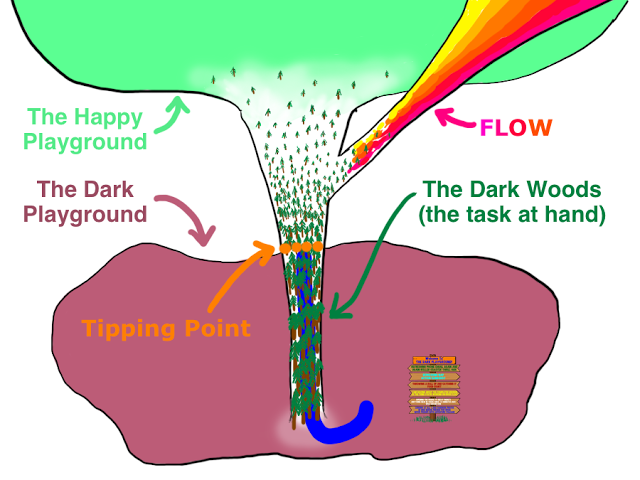
(The Tipping Point) — , (the Happy Playground) , . , , . (the Tipping Point), . , .
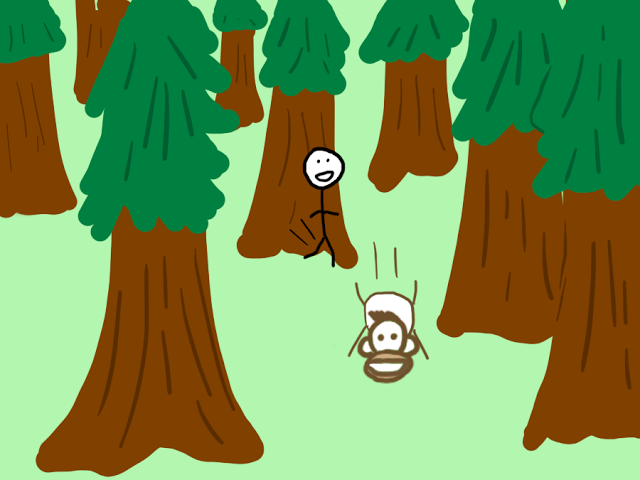
, . , — . .
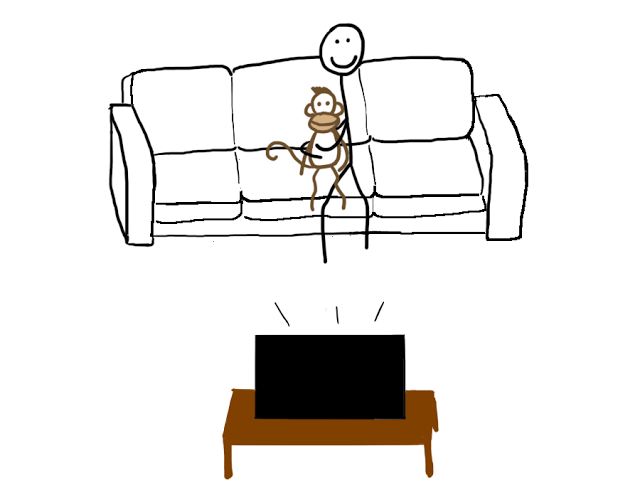
, (the Tipping Point), . , . , . (Flow).
. .

(the Tipping Point) . , . , , .
— . - :
, .
, , . , . , .
1. , — .
, , . , , .
2. ,
:
— , . ( , . .)
— (Panic Monster). , .
— , (the Panic Monster) .
— , .
— , .
- Minimize entertainment. Sell a TV if it really distracts you. Buy a second computer exclusively for work and block Facebook. Turn on Airplane Mode on your phone while working.
If these methods do not work, change them. Set yourself a reminder in a month from the current moment "If the situation has not improved, change the methods."
3. Aim for slow, steady progress.
The key is not to be perfect at once, but simply to improve . An author who writes one page per day will write a book in a year. A procrastinator who gets a little better every week will become a completely different person in a year.
, , . « » « ». , . , .
? — , . , .
— :
UPD: TED-
" Why Procrastinators Procrastinate " " How to Beat Procrastination " , SeoPult .
Source: https://habr.com/ru/post/298192/
All Articles